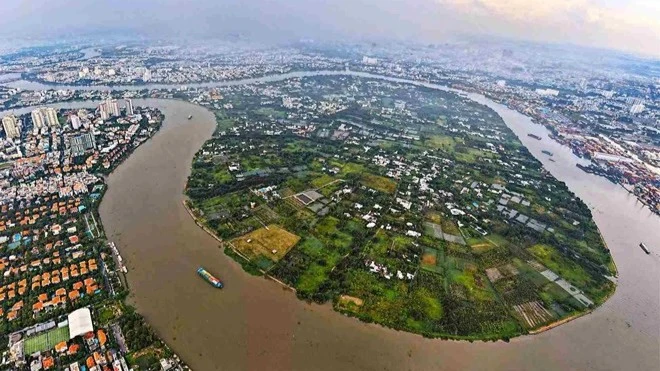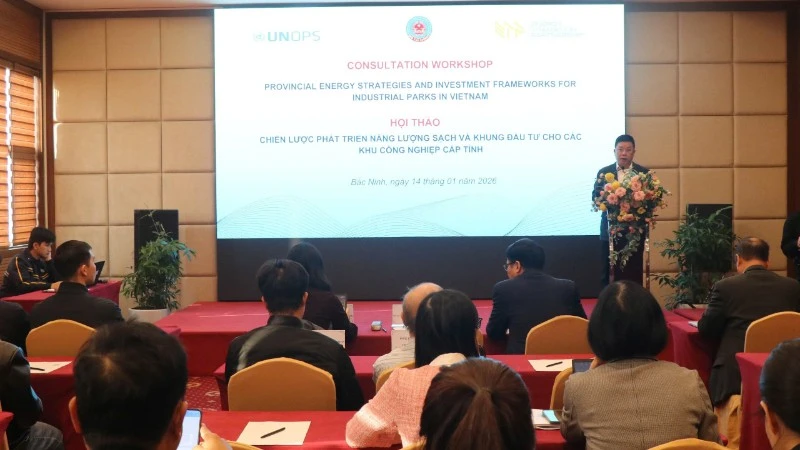In reality, land management and utilisation in the country have revealed several shortcomings and limitations over time. Land resources have not been fully nor sustainably leveraged, with land use still being wasteful and inefficient in many cases.
WASTEFULNESS AND VIOLATIONS IN LAND USE
In response to the need for national protection and defence, land-related policies have been continuously reformed, gradually transforming land resources into capital for the country’s socio-economic development.
The fundamental principles of land management have been progressively shaped through the legal framework on land, from the Land Laws of 1987, 1993, 2003, and 2013, along with various sub-law regulations.
However, land management and utilisation in Vietnam still face numerous shortcomings and limitations, such as: land-use planning lacking synchronisation, comprehensiveness, and systemic quality, with inadequate long-term vision; land resources not being fully and sustainably exploited, leading to wastefulness and inefficiency in certain areas; difficulties in land access for organisations and individuals, particularly ethnic minorities; and issues with land recovery, compensation, support, and resettlement that in some cases fail to balance the interests of the State, land users, and investors.
On the other hand, administrative reforms in land management have yet to meet practical demands; land finance and pricing do not accurately reflect market realities; and land disputes, complaints, denunciations, and violations remain prevalent. The handling of these issues, especially in combating wastefulness and violations in the use of public land, is still insufficient.
According to Report No.330/BC-DGS (dated October 11, 2022) from the National Assembly’s Thematic Supervision Delegation on the implementation of policies and laws on thrift practice and waste prevention in the 2016-2021 period (citing Report No. 1557/BC-TTCP, dated September 12, 2022, from the Government Inspectorate), violations involving 63,200 hectares of land were discovered, with recommendations to recover 31,287 hectares. This includes public land managed by state-owned entities, especially state-invested corporations and general companies, where land use remains problematic and fraught with violations.
Meanwhile, according to the Ministry of Natural Resources and Environment’s report on the implementation of the National Assembly’s Resolution No. 74/2022/QH15 (dated November 15, 2022), the natural resources and environment sector has advised and handled 172 projects and works that either failed to use the allocated land or delayed its utilisation, covering a total area of 6,922 hectares.
A nationwide review identified 908 projects and works with delayed or unused land (yet to be fully addressed), covering 28,155 hectares. Of these, 172 projects (6,922 hectares) have been resolved, with land recovered and project activities terminated; 226 projects (1,719 hectares) have been granted extensions for land use; 106 projects (1,206 hectares) are currently under review; and 404 projects (18,308 hectares) remain unresolved. The lack of strict discipline and compliance in land management and utilisation in some areas, combined with inefficient land exploitation — particularly regarding the recovery of land from unimplemented or delayed projects — has created bottlenecks, leading to significant waste and losses of national and societal resources.
More concerningly, this wastefulness and loss not only diminish financial and asset resources but also result in lost time, opportunities, and other crucial resources that could otherwise be harnessed to unlock the country's potential and drive socio-economic development.
TO MAKE LAND A DRIVING FORCE FOR DEVELOPMENT
To enhance State management of land resources and maximise their potential for national development, the 13th Party Central Committee issued Resolution No.18-NQ/TW on June 16, 2022. This resolution focuses on continuing institutional and policy reforms, improving the efficiency of land management and utilisation, and creating momentum for Vietnam to become a high-income developed country.
To institutionalise Resolution No.18-NQ/TW, the 2024 Land Law — comprising 16 chapters and 260 articles — was passed on January 18, 2024, during the 5th extraordinary session of the 15th National Assembly. Additionally, at the 7th session, the National Assembly passed a law amending and supplementing provisions in the Land Law, Housing Law, Real Estate Business Law, and Law on Credit Institutions, while ensuring that the 2024 Land Law will take effect on August 1, 2024 — five months earlier than originally planned.
Experts and land management professionals recognise the 2024 Land Law as a major step forward in refining institutional frameworks and land policies, aligning them with Vietnam’s socialist-oriented market economy. The law aims to resolve overlapping regulations, address legal inconsistencies, and overcome long-standing challenges in land management and usage.
On the other hand, strengthening land management in terms of area, quality, and economic value is essential. It is crucial to ensure a balance of rights and interests among the State, land users, and investors; promote the commercialisation of land use rights; develop a transparent and healthy real estate market; establish a modern, transparent, and efficient land management system; accelerate administrative reform and digital transformation; improve the land accessibility index; uphold democracy; and minimise land-related disputes and complaints.
Le Minh Ngan, Deputy Minister of Natural Resources and Environment, stated that the 2024 Land Law assigns the government the responsibility of detailing 96 provisions. The government has tasked the Ministry of Natural Resources and Environment with drafting detailed regulations for 86 of these provisions, focusing on key areas such as fundamental land surveys; land use planning; land recovery, compensation, support, and resettlement; land allocation, leasing, and permission for land-use conversion; land valuation; land registration, issuance of land use rights certificates, and property ownership rights attached to land; land use regulations; monitoring, supervision, and evaluation of land management and use; inspection, examination, and auditing; and resolving disputes, complaints, and denunciations, as well as handling violations of land laws.
Under the resolute direction of the government and the prime minister, and to ensure the effective implementation of the 2024 Land Law, the Ministry of Natural Resources and Environment has actively collaborated with relevant ministries, sectors, and agencies to draft and submit to the government four decrees detailing the implementation of the 2024 Land Law, which will take effect simultaneously with the law. These include Decree No. 71/2024/ND-CP (dated June 27, 2024), stipulating regulations on land pricing; Decree No. 88/2024/ND-CP (dated July 15, 2024), regulating compensation, support, and resettlement when the State recovers land; Decree No. 101/2024/ND-CP (dated July 29, 2024), setting out regulations on fundamental land surveys, land registration, issuance of land use rights certificates, ownership of assets attached to land, and the land information system; and Decree No. 102/2024/ND-CP (dated July 30, 2024), providing detailed regulations on the implementation of certain provisions of the Land Law. At the same time, the ministry has also issued, under its authority, four circulars as mandated by the Law.
However, to enhance the effectiveness of implementation and foster social consensus on the enforcement of the 2024 Land Law, in addition to the engagement of the entire political system, it is essential to focus on reviewing and compiling statistics on land-related violations. This will enable the development of solutions to address losses and prevent wastefulness in land management and utilisation.
Authorities at all levels, from central to local, must strictly enforce supervision, inspection, and auditing of land use to minimise misuse or waste of land and ensure compliance with existing legal regulations. This will contribute to effective land management, particularly in unlocking land resources to meet the demands of socio-economic development, ensuring national defence and security, and promoting sustainable growth in the context of accelerating industrialisation and modernisation. At the same time, it will help gradually improve the socialist-oriented market economy framework in Vietnam, both now and in the future.
















